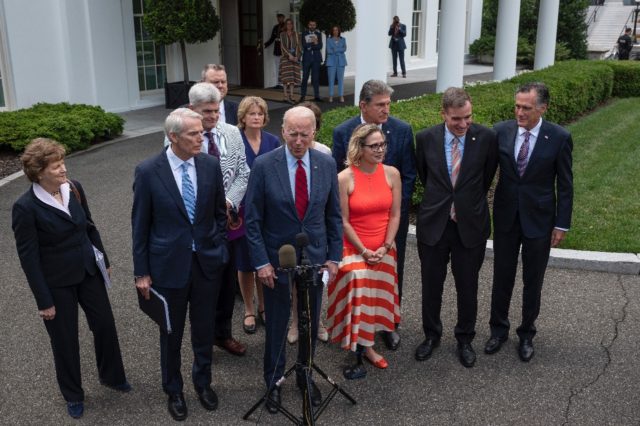US President Joe Biden announced Thursday he has reached a deal with a bipartisan group of senators to rebuild the nation’s infrastructure, likely unlocking the most funding for roads, bridges and ports in decades.
“We have a deal,” Biden said at the White House, adding on Twitter that a group of five Democrats and five Republicans “has come together and forged an infrastructure agreement that will create millions of American jobs.”
Biden, highlighting the historic nature of the agreement, took the unusual step of walking out of the West Wing to join the lawmakers speaking to reporters about the deal.
The president sat down with the senators at the White House to cap weeks of tense negotiations on Capitol Hill, where Democrats and Republicans have squared off over the size and scope of the funding.
Biden was due to deliver remarks on the deal at 2:00 pm (1800 GMT), the White House said.
A breakthrough on a tentative agreement came late Wednesday, with the senators agreeing on a $973 billion package over five years, with some $559 billion in new funding.
“No one got everything they wanted in this package. We all gave some to get some because what we did was put first the needs of our country, said Senator Kyrsten Sinema, a centrist Democrat from Arizona.
“This does represent a historic investment in our country’s infrastructure.”
Republican Senator Bill Cassidy agreed, calling the bill “great progress.”
“A bridge is coming near you. Not right away, not tomorrow, not next year,” he said. “But we’ve begun the process.”
‘Two tracks’
But negotiations on infrastructure are not over.
Biden has proposed some $2 trillion in infrastructure spending over eight years, including funding for some of his priorities like climate change mitigation, child care, schools and social services.
Republicans firmly opposed any inclusion of such projects in the deal, saying only traditional infrastructure like roads, airports or broadband internet should be included.
But Democratic leaders are insisting that the “human infrastructure” projects be funded in a second track known as budget reconciliation, which can pass the 100-member Senate with a simple majority rather than the 60 votes necessary to advance major legislation.
“We will not take up a bill in the House until the Senate passes a bipartisan bill and a reconciliation bill,” House Speaker Nancy Pelosi warned earlier Thursday.
That statement drew applause from progressive Democrats, including congresswoman Alexandria Ocasio-Cortez.
Congressional Democratic leaders have indicated they would like the House and Senate to vote on the infrastructure bills later this summer.
Senate Majority Leader Chuck Schumer said the first votes on the bipartisan bill should be held in July.
He also said that while he was “encouraged” by the progress of the bipartisan group, like Pelosi he insists on two bills operating in tandem.
“We are making two tracks,” Schumer said.
“If the Senate is going to move forward with a bipartisan infrastructure bill, we must also move forward on a budget resolution as well.

COMMENTS
Please let us know if you're having issues with commenting.